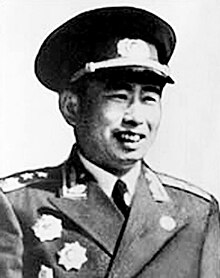Song Renqiong
This article relies largely or entirely on a single source. (January 2023) |
You can help expand this article with text translated from the corresponding article in Chinese. (March 2023) Click [show] for important translation instructions.
|
Song Renqiong | |
|---|---|
| 宋任穷 | |
 | |
| Personal details | |
| Born | 11 July 1909 Liuyang, Hunan, China |
| Died | 8 January 2005 (aged 95) Beijing, China |
| Awards |
|
| Military service | |
| Branch/service | |
| Rank | |
Song Renqiong (Chinese: 宋任穷; pinyin: Sòng Rènqióng; Wade–Giles: Sung Jen-ch'iung; 11 July 1909 – 8 January 2005), born Song Yunqin (Chinese: 宋韵琴; pinyin: Sòng Yùnqín), was a general in the People's Liberation Army of the People's Republic of China (PRC) and one of the Eight Elders of the Chinese Communist Party.
Biography
[edit]Song Renqiong was born in Liuyang, Hunan Province in 1909.[1]
During the Second Sino-Japanese War, he was the vice director of the political department of the 129th Division. Toward the end of the Chinese Civil War, he was the vice political commissar of the Northeastern Field Army.
After the establishment of the PRC in 1949, he was the secretary of the Chinese Communist Party (CCP)'s committee in Yunnan Province, Vice Secretary of the Southwestern Bureau of the CCP, Vice Secretary-general of the CCP Central Committee, minister of No. 2, No. 3 and No. 7 Mechanical Industry Department, and No. 1 Secretary of the Northeastern Bureau of CCP. He was the Vice Chairman of the 4th and 5th National Political Consultative Conference. He was an alternative member of the Politburo of the 8th CCP Central Committee, a Secretary of the Central Secretariat of the 11th CCP Central Committee, and a Politburo member of the 12th. Like many others, he was purged during the Cultural Revolution and rehabilitated after Mao's death. He was the vice-chairman of the PRC's Central Advisory Committee and served under Deng Xiaoping. Although the commission was in theory a council of retired elders with no official power, members effectively held veto power over major policies and personnel affairs. During the Tiananmen Square protests of 1989, Song was one of the most ardent supporters of Deng, who decided to use violence to crush the student movement. He was one of the influential Chinese leaders during the 80s and is considered to be one of the Eight Elders of the Chinese Communist Party.
Song Renqiong retired from politics after the Central Advisory Committee was abolished in October 1992.
Death
[edit]He died aged 95, on 8 January 2005 in Beijing, following an illness. Though Song Renqiong had died before Zhao Ziyang, he had requested that his floral wreath and elegiac couplet appear in Zhao's funeral. His funeral was held on 15 January. The highest Chinese officials, including Hu Jintao and Jiang Zemin, attended his funeral. The Chinese media reported Song as "an outstanding member of the Communist Party, a great Communist soldier, a remarkable proletarian revolutionary and a prominent leader of the party's political work."
See also
[edit]References
[edit]Citations
[edit]- ^ Bartke 2012, p. 406.
Bibliography
[edit]- Bartke, Wolfgang (2012) [1997]. "Biographies P-Z". Who was Who in the People's Republic of China: With more than 3100 Portraits. Vol. 2. Munich: Walter de Gruyter. ISBN 978-3-11-096823-1.
- 1909 births
- 2005 deaths
- Politicians from Changsha
- Chinese Communist Party politicians from Hunan
- People's Republic of China politicians from Hunan
- Political office-holders in Yunnan
- Members of the Secretariat of the Chinese Communist Party
- Chinese military personnel of World War II
- Members of the 12th Politburo of the Chinese Communist Party
- Vice Chairpersons of the National Committee of the Chinese People's Political Consultative Conference
- Burials at Babaoshan Revolutionary Cemetery
